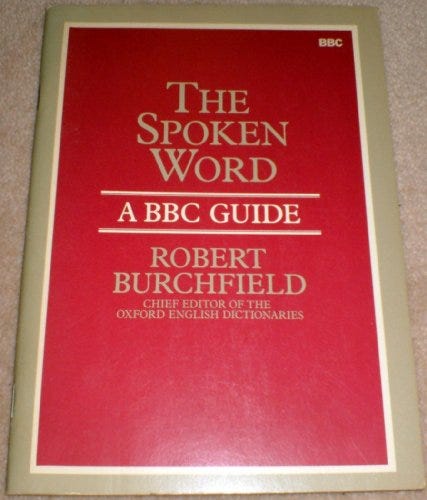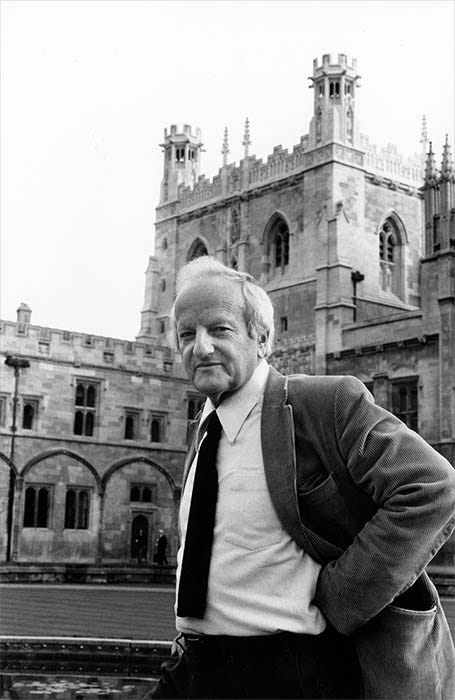Hello and welcome to Cambridge Ladies’ Dining Society. This week’s post is about Robert Burchfield, a New Zealand scholar who made his home in England and dedicated his life to dictionaries and the study of the English language. When in 1980 he was asked by the BBC to offer his advice on the thorny issue of ‘good English’, he became an unlikely celebrity, with appearances on TV and radio. He later became a more contentious figure, as this article reveals, but for the nascent lexicographer that I was in 1980, he was a hero. This article was first published in Slightly Foxed, whose editors kindly have given me permission to republish it here.
An unusual lexicographer
In the early 1980s, my summer job was helping out at the local newsagent’s in my home town, a small seaside resort in Northern Ireland. Apart from dusty tourist guides and Old Moore’s Almanack, there weren’t many books for sale. Tidying the shelves one day, however, I came across a slim volume with an important-sounding title. Something told me that The Spoken Word: A BBC Guide was the book I had been wanting for a long time, without realizing it. I handed over £2 of my hard-earned wages, and took it with me when I went back to university that autumn.
Ever since then, books about words have piled up on my desk, including Fowler’s Modern English Usage, a Roget’s Thesaurus and the 1987 ‘Compact Edition’ (still huge) of the Oxford English Dictionary which came with its own magnifying-glass. But over the years Robert Burchfield’s little book – you might even call it a booklet – is the one that I have turned to most often. It helped me to learn how to write.
The Spoken Word, published in 1981, was produced in response to a wave of complaints to the British Broadcasting Corporation about falling standards in spoken English. A new era of broadcasting had begun in the 1970s, as the BBC changed from being the Reithian home of ‘received pronunciation’ to something broader, permitting more regional accents and informal language. Many people felt that the move towards linguistic diversity had gone too far, resulting in what the critic Anne Karpf so eloquently described in 1980 as ‘English as she is murdered on radio’.
The BBC felt that its broadcasters needed help in deciding what was acceptable and what was not, and commissioned a brief, no-nonsense guide from Dr Robert Burchfield. There was probably no one who knew the English language better, or how it had changed in recent times. Burchfield was the editor of the supplement to the Oxford English Dictionary, the great twelve-volume dictionary that had been published between 1879 and 1933. When he first took charge in 1957, Oxford University Press estimated that the work would produce a single volume within seven years. Instead the Supplement comprised 60,000 new entries, took up four large volumes and was not completed until 1986.
Robert Burchfield was, on the face of it, an unlikely lexicographer. Born in Waganui, New Zealand, in 1923, he later claimed that his parents had just one book in the house, a socialist tract. In 1944, while on wartime service in Italy, he stumbled across Frederick Bodmer’s The Loom of Language: A Guide to Foreign Languages for the Home Student. It was a book that changed his life, sparking off a fascination with words and their origins. After the war, he was awarded a Rhodes scholarship and moved to Oxford, where he was taught by C. S. Lewis and J. R. R. Tolkien. Burchfield might easily have opted for a quiet, scholarly life working on Old Norse poetry, but instead he accepted the challenge of bringing the Oxford English Dictionary into the twentieth century.
Updating the OED was a monumental task, requiring dogged patience and a team of dedicated workers, one of them the young Julian Barnes. The first two volumes of the Supplement (A–G and H–N) appeared in 1972 and 1976 respectively and, to his surprise and delight, Burchfield became something of a celebrity. He was a genial figure who featured on Desert Island Discs and regularly appeared on radio and television to give his views on current trends in spoken English. ‘I can’t understand what the young are saying any more,’ the former Prime Minister Edward Heath grumbled to him on the BBC’s Nationwide in the summer of 1979.
Keep reading with a 7-day free trial
Subscribe to Cambridge Ladies' Dining Society to keep reading this post and get 7 days of free access to the full post archives.





